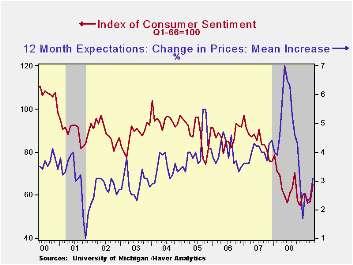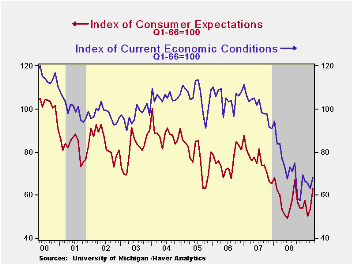 Global| May 01 2009
Global| May 01 2009Michigan Consumer Sentiment Improves Further To Highest Since September
by:Tom Moeller
|in:Economy in Brief
Summary
Despite lower levels of employment, the University of Michigan's April reading of consumer sentiment added to its March improvement and rose to the highest level since September of last year. The gain in the index to a level of 65.1 [...]

Despite lower levels of employment, the University of Michigan's April reading of consumer sentiment added to its March improvement and rose to the highest level since September of last year. The gain in the index to a level of 65.1 was steeper than the mid-month indication of a rise to 61.9 and exceeded Consensus expectations for a reading of 61.7.
The expectations component of consumer sentiment continued to show the largest improvement in April with a 17.9% rise on top of the 5.9% March rise. Expectations for business conditions during the next five years moved up by more than one-quarter m/m to the highest level since September (+14.1% y/y). Expected conditions during the next year rose by roughly the same amount m/m and they're up by more than one-third y/y. Finally, the higher stock market lifted the expected change in personal finances. The reading made up declines early this year with a 11.5% m/m increase to the highest level since September.
The current economic conditions index made up the declines of the prior two months with a 7.9% rise which was near the gain indicated mid-month. Buying conditions for large household goods recouped the declines of earlier this year while the view of current personal finances improved with the stock market and lessened growth in debt.
The opinion of government policy, which may eventually influence economic expectations, was roughly unchanged m/m but held onto its sharp February and March gains. The level was near the highest level since January of 2007. Twenty-one percent of respondents thought that a good job was being done by government, up from the four percent low of last December, while a much reduced 26 percent thought that a poor job was being done.
Probably reflecting the recent rise in oil prices, inflation expectations for the next year rose to 3.1% though they were as high as 7.0% last May. The median expected increase rose to 2.8% from 2.0%. The range of expectations is from slight price deflation to a 5.2% increase in prices. The expected inflation rate during the next five years rose slightly to 3.1%.
The University of Michigan survey data is not seasonally adjusted. The reading is based on telephone interviews with about 500 households at month-end; the mid-month results are based on about 300 interviews. The summary indexes are in Haver's USECON database with details in the proprietary UMSCA database.
Raising the credit bar, or getting clubbed by it? from the Federal Reserve Bank of Minneapolis can be found here.
| University of Michigan | Final-April | Mid-April | March | February | April y/y | 2008 | 2007 | 2006 |
|---|---|---|---|---|---|---|---|---|
| Consumer Sentiment | 65.1 | 61.9 | 57.3 | 56.3 | 4.0% | 63.8 | 85.6 | 87.3 |
| Current Conditions | 68.3 | 66.6 | 63.3 | 65.5 | -11.3 | 73.7 | 101.2 | 105.1 |
| Expectations | 63.1 | 58.9 | 53.5 | 50.5 | 18.4 | 57.3 | 75.6 | 75.9 |
Tom Moeller
AuthorMore in Author Profile »Prior to joining Haver Analytics in 2000, Mr. Moeller worked as the Economist at Chancellor Capital Management from 1985 to 1999. There, he developed comprehensive economic forecasts and interpreted economic data for equity and fixed income portfolio managers. Also at Chancellor, Mr. Moeller worked as an equity analyst and was responsible for researching and rating companies in the economically sensitive automobile and housing industries for investment in Chancellor’s equity portfolio. Prior to joining Chancellor, Mr. Moeller was an Economist at Citibank from 1979 to 1984. He also analyzed pricing behavior in the metals industry for the Council on Wage and Price Stability in Washington, D.C. In 1999, Mr. Moeller received the award for most accurate forecast from the Forecasters' Club of New York. From 1990 to 1992 he was President of the New York Association for Business Economists. Mr. Moeller earned an M.B.A. in Finance from Fordham University, where he graduated in 1987. He holds a Bachelor of Arts in Economics from George Washington University.
More Economy in Brief
 Global| Feb 05 2026
Global| Feb 05 2026Charts of the Week: Balanced Policy, Resilient Data and AI Narratives
by:Andrew Cates






